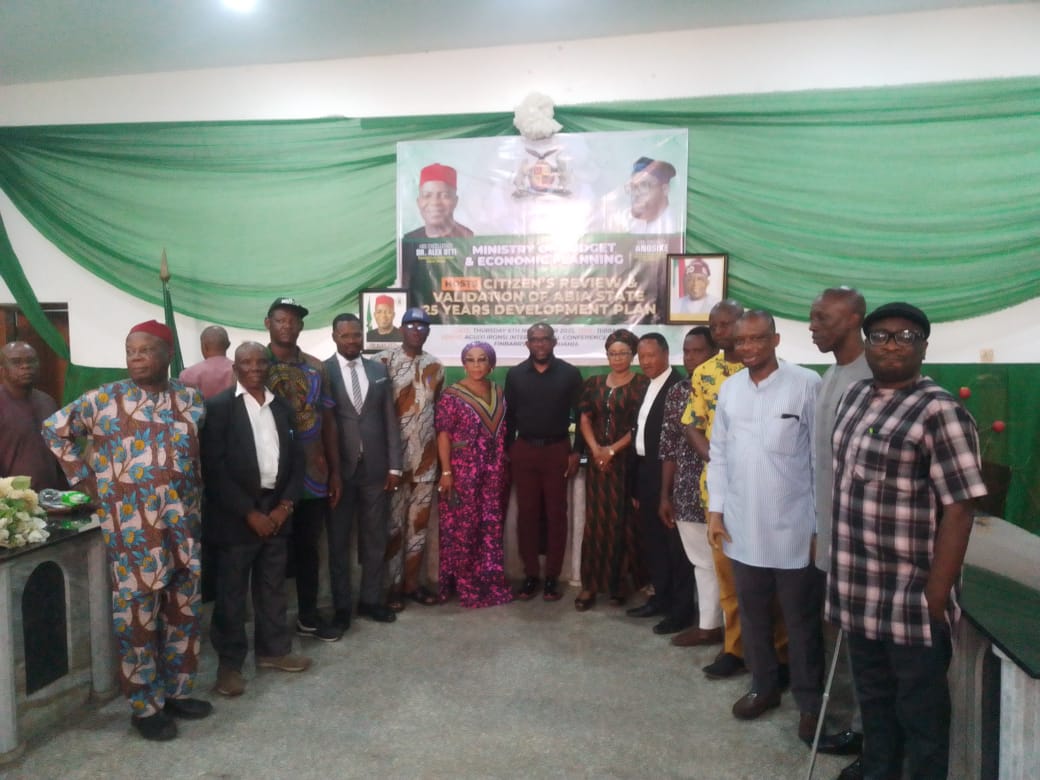The Abia State Government has presented a 25-year Development Plan that aims to transform the State into a ₦30 trillion economy by 2050,
anchored on six strategic pillars of growth, stability, governance reform and inclusive development.
The plan, unveiled on Thursday, during the “Citizens’ Review and Validation of the Abia State 25-Year Development Plan” held at the Aguiyi Ironsi Conference Centre, Umuahia, aims to establish a long-term development framework that will outlive successive administrations and position Abia State as a model of sustainable governance and economic transformation in Nigeria.
Speaking at the event, the Commissioner for Budget and Economic Planning, Mr Kingsley Anosike, disclosed that the 356-page Development Plan is structured into four phases, with provisions for citizens’ participation through a referendum.
Mr Anosike explained that a comprehensive risk assessment had been conducted on the plan to ensure its feasibility and sustainability, adding that it would be formally launched by Governor Alex Otti on 28th November 2025.
The Commissioner further explained that the Development Plan was designed to consolidate the State’s rapid economic transformation since Governor Otti assumed office in 2023.
“Between 2023 and now, all of us are witnesses to the very transformative activities going on in the State.
“The State will continue to exist even after this administration. That is why the Governor assembled a team of professionals and development partners to produce the Abia State Development Plan, which will guide us up to 2050”, he said.
Mr Anosike noted that the document is a reviewed version of the 35-year plan produced by the previous administration, refined to reflect current realities and future expectations.
He said the Plan is anchored on six key pillars including, People and Resources, Growth and Stability, Sustainable Economy, Social Infrastructure and Inclusion, Governance and Reform as well as Cross-Sector Linkages.
The Commissioner highlighted Abia’s fiscal turnaround, noting that the State’s budget rose significantly in 2024 and 2025, with projections set to surpass ₦1 trillion in 2026.
“Before 2024, the highest internally generated revenue (IGR) was ₦18 billion, recorded in 2018. This year alone, as of June, the State had already collected over ₦50 billion.
“This is because we blocked leakages and stopped the old practice of harassing taxpayers”, he explained.
Mr Anosike added that the State is devoting ₦811 billion to infrastructure in the 2026 fiscal year, as part of its drive to close development gaps, stimulate economic activity and attract investors.
“Today, Abia State is a ₦3.5 trillion GDP economy. In 25 years, this State would be a ₦30 trillion economy by God’s grace and by your support”, he stated.
The Commissioner emphasised the present administration’s commitment to Civil Service Reforms, Fiscal Transparency and Governance Stability.
He noted that the Otti-led Government has entrenched a merit-driven system where “appointments as Permanent Secretaries are no longer based on political affiliation but on competence and performance”.
On investment attraction, the Commissioner noted that global investors are now visiting the State directly, a shift he credited to the conducive business environment and investor-friendly policies of the Otti-led administration unlike in the past when Governor’s had to travel abroad in search of investments.
“The business of Government is to create an enabling environment for investment. Once that is done, the investment will come. Money is a very shy product, it goes where it is treated well, where there are good roads, hospitals, schools, and security”, he said.
The Commissioner stressed that political stability and Stakeholder collaboration are essential to sustaining growth.

“Lagos has been able to grow consistently because of its 50-year development plan that every administration follows. If we must achieve our 2050 goals, we must ensure political continuity and partnership among all stakeholders”, he said.
The Special Adviser to the Governor on Budget and Planning, Dr Henry Egwuibe, in his remarks said the essence of the session was to ensure that every stakeholder across all sectors is involved in shaping the future of Abia.
“If you don’t have a plan, it makes it difficult for you to know what you are going to do. Today, we are presenting to you the look-ahead to Abia State in the next 25 years.
“At the end of the day, it becomes Abia State’s document and not the Government’s alone. We thank His Excellency, Dr Alex Otti, for his passion and for ensuring that Abia ranks among the committee of states in Nigeria. As he always says, after working on Abia, other states will look like villages”, Dr Egwuibe added.
Contributing, the First Deputy Chairman of the Abia State Council of Traditional Rulers, Eze Nelson Nmerengwa, commended the Otti-led administration for what he described as a “bold and visionary step that looks beyond electoral cycles to the destiny of generations yet unborn,” as he endorsed the 25-Year Development Plan process.
Eze Nmerengwa assured that traditional rulers across the state would mobilise their councils to sensitise their wards on the contents of the development plan, safeguard its integrity, ensure that projects are not hijacked by political expediency and monitor its milestones.
“On behalf of the Abia State Council of Traditional Rulers, we are not just participants, we are partners in building an Abia where tradition and progress walk hand in hand”, he stated.
The event, which featured an interactive session, brought together representatives of professional bodies, religious organisations, the private sector, civil society groups and members of transport unions to contribute to the State’s long-term development trajectory.
The Permanent Secretary, Ministry of Budget and Economic Planning, Lady Meg Onwu-Kalu, alongside other top government officials attended the event.
By Amarachi Uzoukwu

























